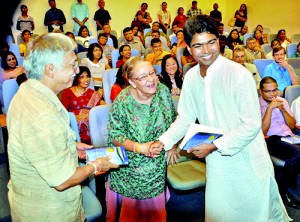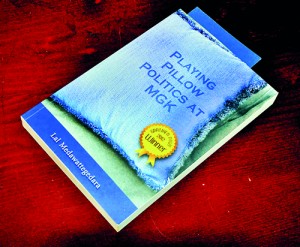A fantastical Lankan novel
View(s):This, the 2013 Gratiaen Prize-winning novel, is remarkable and unusual. ‘Remarkable’ because it is a work of high imagination written in simple and immediately comprehensible English. ‘Unusual’ because the results of Lal Medawattegedera’s imagination are applied in an unusual context, presented [by the Publisher] in an unorthodox way, using an unconventional short yet elegant and proportioned structure, rarely applied in English-language Lankan fiction, and yet retaining, through-and-through, its Sri Lankan-ness.
All of this may suggest to a potential reader that the work might be off-putting but instead, perhaps surprisingly, it is not only extremely readable it is virtually not-put-down-able!

The 2012 Gratiaen Award winning novel 'Playing Pillow Politics at MGK' by Lal Medawattegedara was launched in November at the Lakshman Kadirgamar Institute for International Relations & Strategic Studies. Here the author presents a book to the US writers Ken and Visakha Kawasaki who were the language editors of the book. Pix By Mangala Weerasekera
Without revealing too many of the novel’s enjoyable secrets its protagonist is a crippled non-speaking boy communicating only in grunts but believed by his local community to be a god. The story unfolds to the reader – somewhat unusually – via his communication with a long-life ‘Dearest CFL bulb’! Through these processes the fantastical incidents – entirely believable and often recognisable — through Sri Lankan characters are revealed to us. Not content with this less than orthodox approach Lal Medawattegedera then peoples a mountain—the Maha Geeni Kanda or MGK’ of the title — with these fantastical people but who remain entirely believable characters. One of these – Natami the ‘coffin carrier of the mountain’ – is blessed with the capability, after resting his head on other people’s pillows [supplied to him] of learning the contents of their minds and memories and it is these ‘pillow politics’ that carry the events to their denouement. Such is the author’s imagination.
Amazing are the concepts that the novel embraces. Unusual is the structure and application of non-novelistic practices – such as the use of the very Singlish ‘throw-away’ word of ‘Anyway …’ and numbered paragraph listings – yet in so doing Lal has created stories that ensure that the work remains a truly Sri Lankan novel and not one in which ‘Lankan-ness’ is applied-like an appliqué stuck onto a story by the use of Lankan names or artefacts [ such as ‘ambul thiyal’ or ‘veniwelgetta’ and ‘Toyota Nanda - parking attendant’] – all of these are present and further embellished with quotes from songs by Amaradeva, Victor Ratnayake and Milton Mallawarachchi.
There are gently wicked touches such as references to the novelist Ashok Ferrey [one of his Gratiaen Prize competitors], to Sri Lankan situations, political events and people that although lightly touched upon are easily recognised. [Suggesting that when, in the future, this work finds a place, as it should in any ‘0’ or ‘A’ level examinations, Notes, as in the copiously-annotated Arden Editions needed to  fully appreciate a Shakespeare play will be required]. It is these that ensure that ‘PPP at MGK’ remains a truly through-and-through Lankan novel because its characters exhibit truly Lankan traits and these contribute to ensuring that, although written in English, it remains a genuinely Sri Lankan creation.
fully appreciate a Shakespeare play will be required]. It is these that ensure that ‘PPP at MGK’ remains a truly through-and-through Lankan novel because its characters exhibit truly Lankan traits and these contribute to ensuring that, although written in English, it remains a genuinely Sri Lankan creation.
The publishers – Akna are part of the success because of the book’s physical lay-out and are therefore to be congratulated in producing an extraordinary-looking text that cannot have been easy to edit or to reproduce. Without such care and attention enjoyment in reading the novel would have been much reduced.
In spite of all these tricks, touches and references Lal Medawattegedera’s imagination is never allowed to run riot; it is always held in check and well-controlled in order to create this fantastical novel which, although contemporary — heightened by the English words used and Sinhala phrases employed — remains rooted in a recognisable Sri Lanka. It is an amazing creation making history [I believe] as a ‘new’ Lankan novel in English and one of which all Sri Lankans interested in their culture and literature can be proud.
| Book facts
‘Playing Pillow Politics at MGK’- |



